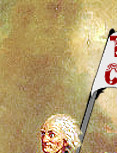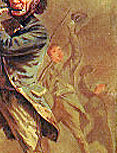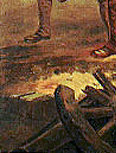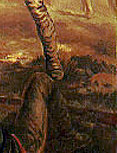|
|
|
August 31, 1999 THE 'LOSS' OF CHINA, McCARTHY, KOREA, AND THE NEW RIGHTA NEW CRUSADE TAKES FORMIn March 1947, President Harry Truman announced his Doctrine of "containing" communism by giving aid to all nations, anywhere, resisting it. The proposal he set before Congress was an aid package to defeat the Communist-led insurgency in Greece and promote the security of Turkey. In a reversal of later ideological stereotypes the main opposition to this grandiose policy came from right-wing Republicans who had not yet forgotten the "isolationist" assumptions which came to them from classical liberalism and republicanism. Congressman Frederic C. Smith (R-OH) said that we were "launching upon a program of imperialism," while Congressman Howard Buffett (R-NE) called the Truman Doctrine "the most dangerous scheme ever considered by an American Congress." The bill passed, but the bloc of unreconstructed Republican "isolationists" remained a thorn in the side of the Cold War Liberals. Supporters of the Marshall Plan in late 1947 gained the votes of those rightists known as the China Lobby by promising aid for dear old Chiang Kai-shek to the tune of $570 billion in general aid and an additional $125 billion for military purchases. China Lobbyists thus played a role in making the Cold War Liberals' imperial policies possible; they also contributed thereby to a metamorphosis of the American Right. SOMEONE 'LOSES' CHINAFor that transformation the critical years were probably 1949-1950. McCarthyism played a role, but McCarthyism itself derived much of its believability from American shock at the "loss" of China. Collapse of the Nationalist regime (Kuomintang) in December 1949 was, as historian William L. Neumann wrote, "an even greater disaster for American policy than Pearl Harbor." For proponents of the Open Door – a program of state-supported penetration of world markets by US businesses – loss of the fabled China Market nullified the purpose of the Pacific War. The interest of some Republicans in Asian markets went back to 1898, when William McKinley's Spanish-American War gained us the Philippine Islands as a forward position for entry into the China market. Chiang's Nationalist Army had been good mostly for squeezing the peasants and not very good at fighting either the Japanese or the Chinese Communists. His government rested on the landlords and its runaway inflation of the money supply ruined the urban capitalist wing of the Kuomintang party and drove the middle classes into the arms of the Maoists. This was the regime extolled by the China Lobbyists like Senator William Knowland (R-CA) and Congressman Walter Judd (R-MN) as a wonderful "freedom-loving" ally. The "fall" or "loss" of China was essentially due to internal causes. For once, a State Department White Paper showed a nodding acquaintance with the truth. But the two basic options for US policy prior to December 1949 – get out, or commit US forces to the impossible task of saving Chiang – had not been squarely faced. The China Lobby was able to prevent rapid withdrawal and its successes (noted above) provided billions of dollars to pour down that particular foreign rat-hole (to use an Old Right phrase). Between the Cold War Liberals, the China Lobbyists, and the "internationalist" Republicans, there were enough votes to put Truman's various foreign policy initiatives through, despite the persistence of the "isolationists" and economizers. THE ROLE OF McCARTHYISMMuch has been made of the evils of something called "McCarthyism" – apparently America's close brush with "fascism" and something always to be expected from the Right. Those who peddle these horror stories pass lightly over the genuinely totalitarian repression undertaken by Saint Woodrow, who, despite his great talent for self-deception, knew down deep that the American people hadn't really been all that keen on making the world safe for his abstractions and would therefore need coercing. Nor do these talespinners worry much about the repression during FDR's war – rather milder than Wilson's because there was more resignation than open opposition, the second time around. Now I doubt that hundreds of Borsht Belt comedians got rooms on upper floors of chic hotels and then defenestrated themselves, leaving the curtains fluttering accusingly in the direction of Joe McCarthy, as in the Woody Allen version of the period. Some of these Stalinists and parlor pinks did fairly well in the end. It was Cold War Liberals – once again – who had taken the first steps in instituting "loyalty" programs and rooting communists out of government, now that their front had changed. Joe McCarthy, the junior Senator from Wisconsin, who had never been especially right-wing or "isolationist," seized the issue of internal communist subversion and used it against the Liberals. McCarthy's mass base believed that in attacking the Northeastern elites McCarthy was attacking communism. Peter Viereck and Carroll Quigley, among others, made this point, but from the standpoint that it was bad form to attack these elites for any reason at all. The real "isolationists" were ambivalent about McCarthy's activities, but many supported him, for a number of reasons: as payback for their troubles in 1940-45, because they shared his sense that the enemy was at home, out of partisan use of a good issue against the Democrats, and because there were communists in government1, who had served in the great antifascist coalition while Joe Stalin was our avuncular and loveable ally. (And who did promote that Major?) In the end, some Old Rightists concluded that McCarthy had missed the mark by focusing on communism rather than generic statism, which had many forms. In the meantime, McCarthyism, as Justin Raimondo remarks, "blurred the distinctions" between the declining Old Right and the rising New Right. McCarthyite reading of the Chinese Revolution, which blamed a handful of communist sympathizers in academia and the State Department for Chiang's downfall, was of great importance in shifting the heretofore noninterventionist Right to an aggressively interventionist policy in Asia. It seemed to validate everything the Cold War Liberals had been saying in support of their policies in Europe, but revealed the Liberals as inept and compromised by the enemy, especially in Asia. This reading also fit very closely the line taken by the China Lobbyists. THE KOREAN WAR AND 'ASIA FIRST'Into this already seething cauldron fell the Korean War. While Taft and other Old Right spokesmen denounced Truman's mad dash into that "unlicensed slaughter house" (as Frank Hanighen put it) as unconstitutional and unwise, as patriots they felt they had to support the war. Taft and other "isolationists" were all over the ballpark, demanding attacks on Manchuria and generally supporting the political line of the brilliant but erratic General Douglas MacArthur. During these wild cycles, they seemed more like "Asia Firsters" (as Selig Adler called them) indistinguishable from the China Lobby than America Firsters. Taft, it must be added, partly recovered and his last speech, in May 1953, warned of the dangers of intervention in Indochina. Most of the Right shifted, willy-nilly, to the New Right position, which accepted the interventionist Liberals' description of the world but derided their "weak" implementation of their own policy. The Korean War, with its unsatisfactory outcome, seemed further proof. BIPARTISAN INTERVENTIONIST CONSENSUSIn effect, we had two interventionist parties with a sort of division of labor between those who preferred intervening in Europe and those whose hearts were in Asia. In practice, the Asia Firsters had to accept the administration's European policy to get what they wanted. Since the architects of that forward position had no objection to intervening elsewhere, in the end we got general intervention with little nuanced differences in direction depending on who was in office. Eisenhower, the candidate of the internationalists (the "Anti-Taft" so to speak), disappointed some by his reluctance to really risk war, even as his Secretary of State, John Foster Dulles – described by Winston Churchill as "a bull that brought his own China shop with him" – blustered about the globe, looking for more forward positions for the Empire. Eisenhower's moderation won him the criticisms of John F. Kennedy and Barry Goldwater, representing, respectively, the just-do-it school of Cold War Liberal activism and the New Right. Goldwater's visionary Atlanticism, as revealed in his speech accepting the Republican presidential nomination in 1964, must have been a rude awakening for any lingering Asia Firsters, much less America Firsters in the GOP. CHINA LOBBIES, THEN AND NOWThe China Lobby's story was almost told around 1960 in Ross Y. Koen's The China Lobby. But the Lobbyists' were still powerful enough to suppress the book. It reappeared, rather symbolically, in the early 1970s, when the unhappy consequences of the Liberals' proactive stance in Vietnam made it briefly possible to debate the origins of American policy in Asia. In the meantime, the old China Lobby had become the Anti-China Lobby with respect to the Communist Dynasts on the mainland. The US held the Kuomintang occupiers of Taiwan to be the only legitimate government of all China up to 1972, when Richard Nixon and Henry the K played the China card. An embarrassing interlude followed in which there were said to be Two Chinas. That is past and now we have a new China Lobby (Henry Kissinger and a lot of Democrats) and a new Anti-China Lobby (pretty much all of today's Official Right). There seems to be some interchange of personnel between the two. I can't keep up with it, but fortunately Justin Raimondo and some others do. Patrick Buchanan, generally a sound noninterventionist since 1989, has gotten sidetracked, or has sidetracked himself, with nightmares about the Chinese threat. As a friend of mine said the other day, what would be so hard about treating the Chinese with respect.... and nothing else? No special treatment, toadying, or manicures, but also no Yellow Peril, paranoia, or gunboats in the Taiwan straits (much less up the Yangtze like the Panay). It might well be a workable plan and one likely to preserve the peace, but there is nothing in it, I admit, for unbridled Open Door enthusiasts or their successors, the New China Hands, whether they are partisans for or against the present regime. Either way, they aim to meddle and, either way, there's borrowed trouble in it for us. OLDER WAS BETTER
As right wings go, I like the pre-transformation
Right much better. There – on the Old Right – you had
people like Felix Morley, who could write in March 1948 that "The
lives of our youth are not the property of the State, to throw on
a rubbish heap in Korea or Yugoslavia as some brass hat may ordain";
or Howard Buffett, who said in May 1947, of the Greek-Turkish aid
bill: "I would rather put a fully loaded machine gun in the
hands of a delinquent than more opportunities for international
destruction in the hands of our State Department."
Joseph R. Stromberg has been writing for libertarian publications since 1973, including The Individualist, Reason, the Journal of Libertarian Studies, Libertarian Review, and the Agorist Quarterly, and is completing a set of essays on America's wars. He is a part-time lecturer in History at the college level. You can read his recent essay, "The Cold War," on the Ludwig von Mises Institute Website. His column, "The Old Cause," appears each Tuesday on Antiwar.com.
Please Support Antiwar.comA contribution of $20 or more gets you a copy of Justin Raimondo's Into the Bosnian Quagmire: The Case Against US Intervention in the Balkans, a 60-page booklet packed with the kind of intellectual ammunition you need to fight the lies being put out by this administration and its allies in Congress. Send contributions to Antiwar.com or
Contribute Via our Secure Server |









